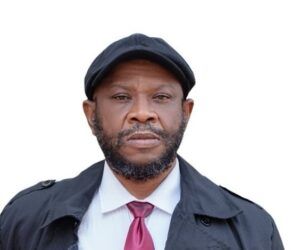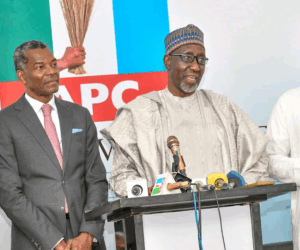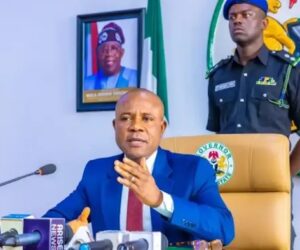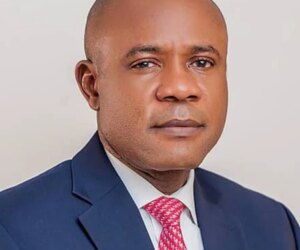1
Mrs Nwanneka Chioma Okpala, a professional educational administrator, is the School Administrator of KOSEC Schools, Lagos. He spoke to EJIKEME OMENAZU on the standard of education in Nigeria among other crucial issues. Excerpt:
How do you see the standard of education in Nigeria?
Nigeria has a set of educational norms and benchmarks that define expected levels of knowledge, skills, and competencies that students should achieve at various stages of their academic journey. These standards pertain to different aspects of education, including curriculum content, teaching practices, assessment methods, and learning outcomes. The standard of education in Nigeria can be viewed as a comprehensive framework that encompasses curriculum relevance, teaching quality, infrastructure, assessment methods, equity, and policy adherence.
Continuous improvement and implementation in these areas is essential for advancing educational standards and addressing the challenges faced by the Nigerian education system.
To put education on a sound footing in Nigeria, the government can implement a multi-faceted approach that addresses the various challenges facing the educational system such as: Increase Funding and budgetary allocation to education sector. Allocate a higher percentage of the national budget to education, aiming to meet the UNESCO recommendation of at least 15-20%. Invest in teachers’ welfare, through better training, salaries and provision of good working conditions.
Equitable Distribution of income: Ensure that funds are distributed fairly across various regions, focusing particularly on underdeveloped areas that face significant educational challenges.eh Borno, Yobe, Sokoto, Zamfara, Adamawa, Sokoto, Katsina, etc.
Curriculum Reforms: Update the curriculum to align with global educational standards and the demands of the 21st-century job market. This includes the integration of digital skills, critical thinking, and vocational training which have started in the new curriculum they just released. Ensure the curriculum reflects local culture, history, and relevance, making learning more engaging and applicable to students’ lives. Enhance Teacher Training, upskilling and support. Invest in ongoing training and professional development programs for teachers to improve their pedagogical skills and knowledge of contemporary teaching methods.
Recruitment and Retention: Implement strategies to attract and retain qualified teachers, including competitive salaries, benefits, and career advancement opportunities.
Improve Infrastructure and Resources. Invest in building and maintaining adequate school infrastructure, including classrooms, laboratories, libraries, and learning materials.
Technology Access: Provide schools with access to technology and resources, including computers and the internet, smart boards to support modern teaching and learning methods.
Strengthen Policy Implementation and Governance. Develop and implement evidence-based education policies that address the unique challenges of the different states and communities in Nigeria.
Monitoring and Evaluation: Establish robust monitoring and evaluation frameworks to assess the progress of educational initiatives and ensure accountability.
Promote Access and Inclusivity: eg Universal Basic Education: Strengthen the Universal Basic Education (UBE) programme to ensure that all children have access to free and compulsory basic education.
Outreach Initiatives: Launch targeted programs to reach out-of-school children, particularly in rural and conflict-affected areas, and provide them with flexible learning opportunities.
Partnerships: Collaborate with non-governmental organizations (NGOs), private sector stakeholders, and communities to develop and implement educational initiatives that meet local needs.
Awareness Campaigns: Conduct campaigns to raise awareness about the importance of education among parents and communities, encouraging them to prioritize and invest in their children’s education.
Set up internal and external bodies to fight the high rate of examination malpractices in Nigeria leading to half backed Nigerian that are unemployable.
By adopting these measures, the Nigerian government can create a more effective, equitable, and robust education system. This will not only equip the current generation with the necessary skills for the future but also foster national development and economic growth. The commitment to education must be sustained and prioritised as a fundamental right and a catalyst for societal progress.
How do you think the issue of out-of-school children in Nigeria should be addressed by the government?
Addressing the issue of approximately 10.5 million Nigerian children between the ages of five and 14 being out of school requires a comprehensive and multi-faceted approach. The government can implement a range of strategies to tackle the root causes of this problem and promote educational access for all children. These include: Strengthening and effective implementation of Universal Basic Education (UBE) Programs. Increase funding for the Universal Basic Education (UBE) program to ensure that it effectively reaches all children and provides free and compulsory education at the primary level.
Strong awareness about the importance of education and encourage participation in school enrollment drives.
School Construction and Renovation: Invest in building new schools, particularly in rural and underserved areas, and ensure that existing schools have adequate facilities, such as classrooms, restrooms, and learning materials.
Focus on Accessibility and inclusion: Ensure that schools are accessible to all children, including those with disabilities, and improve transportation options for students who live far from schools.
Enhance Teacher Training and Recruitment: Invest in training programs to improve the skills of teachers, particularly in underdeveloped areas, to enhance teaching quality.
Incentives for Teachers: Provide incentives for teachers to work in remote or underdeveloped areas, such as housing allowances or competitive salaries.
School Feeding Programmes: Introduce or expand school feeding programs to encourage enrollment and attendance by providing nutritious meals to students. This can help families view education as a viable option.
Promote Inclusivity: Target girls and marginalised groups by creating targeted programs to specifically encourage enrollment and retention of girls and marginalised groups, addressing cultural and social barriers that limit their access to education.
In Conclusion, the Nigerian government must take a holistic approach to address the issue of millions of out-of-school children by tackling both the systemic and immediate barriers to education.
By combining policy reforms, community engagement, and targeted interventions, the government can create an education system that is accessible, equitable, and responsive to the needs of all Nigerian children.
How can the government improve funding for education, and what impact would increased funding have on the system?
The government can enhance funding for education by encouraging private participation sector participation, reallocating budgetary priorities, increasing taxes on luxury goods, and engaging in innovative financing models like education bonds and grants. Increased funding would improve classroom infrastructure, provide better learning materials, and enable higher teacher salaries. This infusion of resources would empower schools to create conducive learning environments, ultimately enhancing student outcomes and retention rates.
What role can technology play in enhancing access to quality education in Nigeria?
Technology can significantly enhance access to quality education by bridging geographical divides. E-learning platforms, mobile apps, and virtual classrooms can provide resources to students in remote areas, breaking the barrier of distance. Furthermore, leveraging technology can facilitate teacher training, enabling educators to share best practices and develop their skills regardless of their location, and thus ensuring a uniform standard of education.
What are the key areas of focus for the Nigerian government’s education policy, and how will they impact the system?
The key areas of focus should include curriculum reform, teacher training, infrastructure development, and equitable access to education. Policies aimed at updating the curriculum to include vocational training and life skills will better prepare students for the workforce. Investing in continuous professional development for teachers will elevate the quality of instruction. Emphasis on infrastructure will create a safe and stimulating learning environment, while policies promoting inclusive education will ensure no child is left behind, fostering a more equitable system.
How can the curriculum be reformed to better align with the needs of the labor market and society?
Curriculum reform should involve collaboration with industry leaders, educational institutions, and policymakers to identify emerging market needs. Introducing STEAM (Science, Technology, Engineering, Arts, and Mathematics) subjects, practical skill-building activities, and work-study programs can make education more relevant. Additionally, integrating soft skills, critical thinking, and entrepreneurship into the curriculum can prepare students not only for jobs but for becoming innovators and leaders in their communities.
How can teacher training programmes be improved to enhance the quality of education?
Improving teacher training programs begins with a comprehensive overhaul of teacher education curricula to include modern pedagogical techniques and subject specific knowledge. Continuous professional development should be mandated, involving mentorship programs where experienced teachers guide novices. Utilising technology can facilitate access to training resources and online courses. Furthermore, partnerships with educational NGOs can help implement effective training modules focused on student engagement and innovative teaching strategies.
How can examination malpractice and other forms of academic dishonesty be addressed?
Combating examination malpractice requires a multi-faceted approach. First, fostering a culture of integrity in schools is crucial, which can be achieved through awareness campaigns and workshops. The implementation of secure examination formats and the use of technology for monitoring during tests can help deter dishonest behavior. Additionally, providing psychological and ethical education will instill a sense of responsibility and the value of honesty in students from an early age.
What incentives could be offered to attract and retain qualified teachers, especially in rural areas?
To attract and retain qualified teachers in rural areas, competitive salary packages, housing allowances, and relocation bonuses may be effective. Offering job security through permanent contracts, opportunities for career advancement, and professional development programs can also motivate teachers to stay in these challenging environments. Furthermore, community engagement initiatives where teachers are recognized and appreciated by the community can foster a deeper commitment to rural education.
What strategies can be employed to address the infrastructure gap in Nigerian schools, including ICT infrastructure?
Addressing the infrastructure gap requires a collaborative effort between the government, private sector, and international donors. Implementing a comprehensive school infrastructure enhancement program focused on renovation and modernization of existing facilities is essential. Furthermore, investing in ICT infrastructure through public-private partnerships can enable the provision of internet access, computer labs, and digital learning materials. Community involvement in maintenance and support can also ensure sustainability.
What role can public-private partnerships play in improving educational infrastructure and resources?
Public-private partnerships can play a pivotal role in enhancing educational infrastructure by pooling resources and expertise. Collaborations can lead to the development of schools and provision of learning materials that may otherwise be financially unfeasible for the government alone. Private companies can also introduce innovative educational technologies and practices that can improve teaching and learning experiences. Moreover, they can engage in community development initiatives that further support education, thus creating a holistic approach to educational enhancement.








